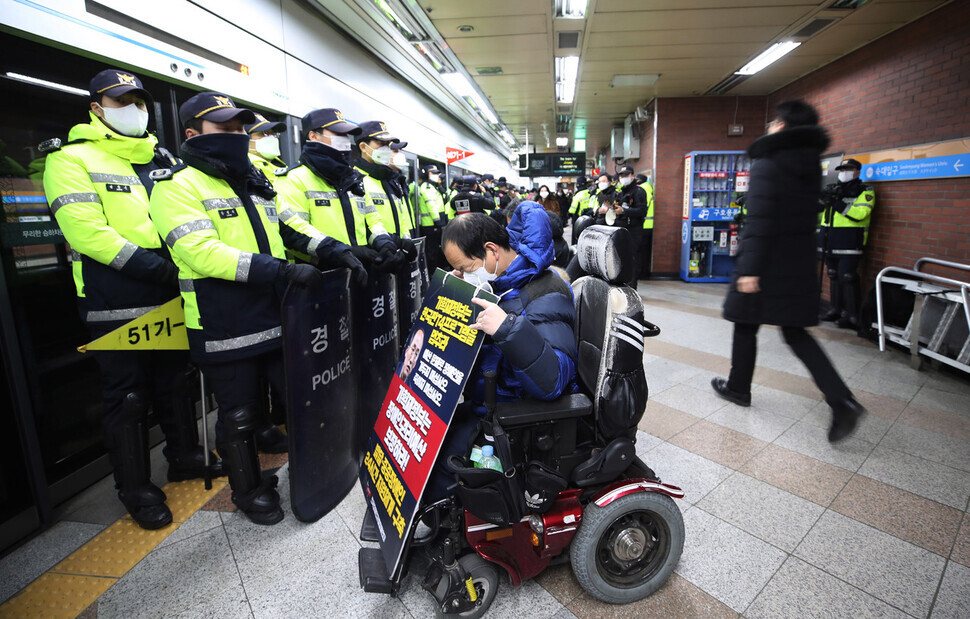hankyoreh
Links to other country sites 다른 나라 사이트 링크
[Editorial] Seoul’s callous response to disability rights protests

The first subway ride action of the new year by the Solidarity Against Disability Discrimination (SADD) was thwarted by Seoul Metro. Seoul Metro reportedly used the power of the police to prevent disabled activists from even boarding the subway train.
Although there had been both small and large scuffles in the past due to SADD’s rush hour protests at subway stations, the group has never been confronted with an all-out blockade like this. The group has been holding protests to demand a budget be secured to protect disability rights.
It is clear to see that Seoul Mayor Oh Se-hoon’s remarks about “zero tolerance” led to a hard-line response by both Seoul Metro and the police. We are speechless at this behavior that suppresses the disabled, who are socially underprivileged, with force.
On Monday morning, SADD attempted to stage a protest action at Samgakji Station on Line 4, but was blocked by Seoul Metro workers and the police. The group said they would protest according to the rules set by a court — namely, to not delay the subway by more than five minutes — but Seoul Metro cracked down on them regardless.
While trying to stop the disabled activists from boarding the subway, Seoul Metro workers and the police forcibly pulled activists away by their wheelchairs.
Also, during the press conference held before the protest, broadcasts calling for the suspension of the protests and expulsion of protesters were broadcast every one to two minutes, interrupting the press conference.
The police went as far as deploying eight riot police units to the subway station to quash the protests. This was clearly an excessive response.
SADD resumed their subway protest because of the meager amount earmarked for disability rights in the budget bill passed by the National Assembly late last year.
The ruling and opposition parties initially agreed to increase the budget for the disabled by 650 billion won (US$500 million) during the budget review process, but ended up only increasing the budget by 10.6 billion won due to opposition from the Ministry of Economy and Finance.
It is obvious that guaranteeing the civil rights of the disabled, such as the right to move, work, and right to education, will not be possible without a sufficient budget.
This is also a limitation that people with disabilities have painfully felt over their 20-year struggle for mobility rights. We must reflect on why Korean disability activists are fighting to secure a budget to the extent of even exposing themselves to hurtful criticism.
SADD said they would hold their protest while adhering to court-mandated rules of not disrupting the subway service for more than five minutes. Any person responsible for holding up service for any longer than that would be fined 5 million won. Nevertheless, Seoul Mayor Oh Se-hoon rejected the court’s mediation plan, saying it would “destroy the rule of law.”
When SADD announced their plan to resume the subway protests, Oh quickly adopted a zero-tolerance stance, promising a stern response by sending in the police.
Is it not overly callous that “zero tolerance” is the only response to the desperate cries of the disabled asking that they be afforded the same rights as their fellow citizens?
Please direct questions or comments to [english@hani.co.kr]

Editorial・opinion
![[Column] Has Korea, too, crossed the Rubicon on China? [Column] Has Korea, too, crossed the Rubicon on China?](https://flexible.img.hani.co.kr/flexible/normal/500/300/imgdb/original/2024/0419/9317135153409185.jpg) [Column] Has Korea, too, crossed the Rubicon on China?
[Column] Has Korea, too, crossed the Rubicon on China?![[Correspondent’s column] In Japan’s alliance with US, echoes of its past alliances with UK [Correspondent’s column] In Japan’s alliance with US, echoes of its past alliances with UK](https://flexible.img.hani.co.kr/flexible/normal/500/300/imgdb/original/2024/0419/2317135166563519.jpg) [Correspondent’s column] In Japan’s alliance with US, echoes of its past alliances with UK
[Correspondent’s column] In Japan’s alliance with US, echoes of its past alliances with UK- [Editorial] Does Yoon think the Korean public is wrong?
- [Editorial] As it bolsters its alliance with US, Japan must be accountable for past
- [Guest essay] Amending the Constitution is Yoon’s key to leaving office in public’s good graces
- [Editorial] 10 years on, lessons of Sewol tragedy must never be forgotten
- [Column] A death blow to Korea’s prosecutor politics
- [Correspondent’s column] The US and the end of Japanese pacifism
- [Guest essay] How Korea turned its trainee doctors into monsters
- [Guest essay] As someone who helped forge Seoul-Moscow ties, their status today troubles me
Most viewed articles
- 1[Column] The clock is ticking for Korea’s first lady
- 2Samsung barricades office as unionized workers strike for better conditions
- 3After 2 months of delayed, denied medical care, Koreans worry worst may be yet to come
- 4[Correspondent’s column] In Japan’s alliance with US, echoes of its past alliances with UK
- 5[Column] Has Korea, too, crossed the Rubicon on China?
- 6Hong Se-hwa, voice for tolerance whose memoir of exile touched a chord, dies at 76
- 7All eyes on Xiaomi after it pulls off EV that Apple couldn’t
- 8US overtakes China as Korea’s top export market, prompting trade sanction jitters
- 9[Photo] Smile ambassador, you’re on camera
- 10[Guest essay] How Korea turned its trainee doctors into monsters